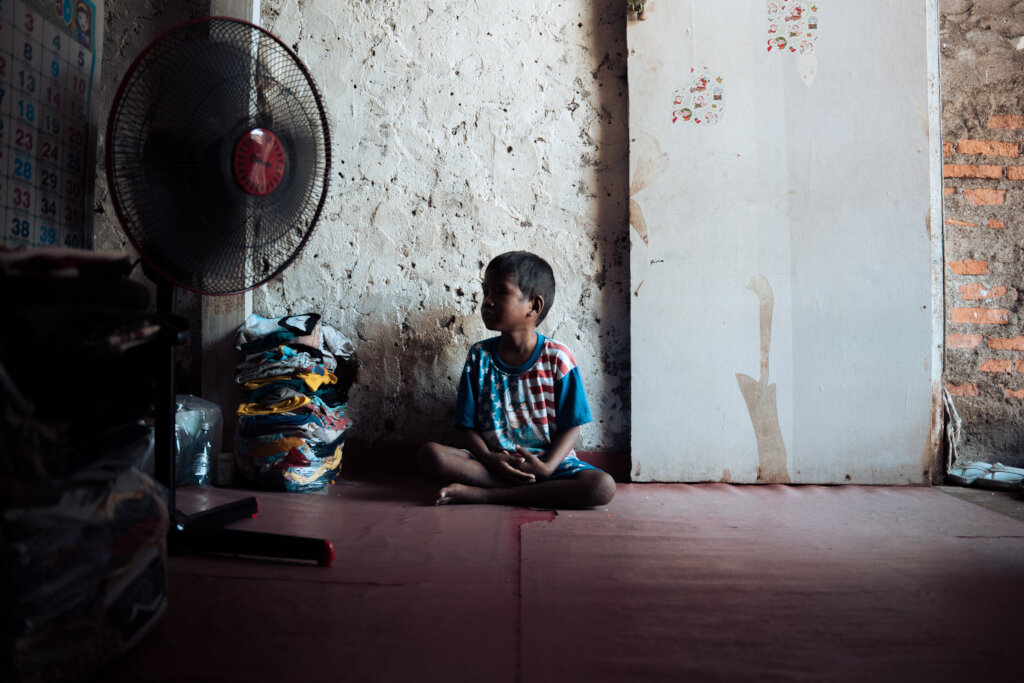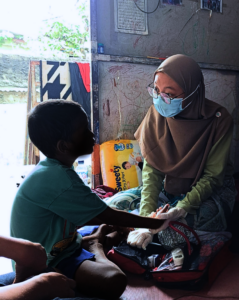(by Yolanda Tasya Amalia – Communications and Fundraising Officer)

Kafi has faced more than his share of hardship at a tender age, losing both parents, living a nomadic life with his sister, and battling an immunocompromising illness. After meeting Rachel House nurses in 2022, Kafi vanished due to the unstable living condition and the general lack of access to care.
When he returned to Rachel House’s care in 2024, he had already lost sight in one eye and was slowly losing vision in thes other. His health had deteriorated significantly with recurring infections, lung damage, anemia. Severe fatigue became part of his daily life; he had to stop attending school, and his world grew smaller with each passing day.
Now he is no longer alone. With the support of his loving aunt and Rachel House nurses, Kafi now receives regular medical visits, safe transportation, and consistent care tailored to his needs.
Despite the grave challenges in his life, Kafi remains gentle, full of joy and wonder. When asked about his dream, he quietly said that he wants to go to the beach and feel the sand between his fingers. In the face of physical discomfort, he continues to see beauty.
In him, we see a quiet kind of courage. One that reminds us why this work of Rachel House matters.
——————
A Persian proverb says, “To a child, the world is a garden full of wonders.”
But what of a child who has lost his sight?
In a quiet corner of the busy metropolis of Jakarta, a child who has recently been robbed of sight dreams of colourful gardens of blossoms, his sense of wonder intact, burning bright in his heart.
Kafi* is not exactly a new face to Rachel House. He is 10 years old and has had health challenges since birth. His journey with Rachel House began in 2022, when he was referred to Rachel House due to a series of health complications, including persistent cough, oral thrush, malnutrition, anemia, and pulmonary tuberculosis. However, a mere two months after his admission, we lost contact with him. At the time, Kafi was constantly on the move with his older sister due to financial difficulties; with no permanent address, he simply vanished from our reach. We later found out that he had also stopped returning to his primary physician, further isolating him from the care that he desperately needed.
It wasn’t until August 2024 that we met him again. By this time, Kafi had moved to live with his aunt, as his sister (his only surviving family member) had moved overseas to work as a migrant domestic worker.
Kafi, a boy who has known more loss and instability than most children, has grown into a soft-spoken boy. Orphaned and once living a nomadic life, with no consistent caregiver, his health has deteriorated.
When our nurses reconnected with Kafi, he had lost vision in his right eye, likely due to complications from an untreated, immunocompromising illness. He was also struggling with frequent shortness of breath, a persistent cough, oral thrush, dry scarring on his skin, itchiness, and dizziness. And just when it seemed things couldn’t get worse, the vision on his left eye —the one he relied on— started to blur. It began with severe headaches and a teacher’s observation that he could no longer write properly. Soon, the classroom became a blur, quite literally, and he was forced by the school to stop coming altogether.
Flame of courage that burns bright – a garden of gratitude blooms
At his second admission to Rachel House’s service, our nurses faced a daunting challenge of stabilizing Kafi’s fragile health condition. Beyond his worsening vision and untreated infections, he also showed signs of bronchiectasis —a condition that severely damages the lungs and makes breathing an everyday struggle— along with recurring anemia. Our nurses worked tirelessly to manage the symptoms and ease his pain.
Reading all of this, it would be easy to imagine Kafi as a sorrowful, withdrawn boy, weighed down by his circumstances. But when I had the chance to visit him alongside Rachel House’s nurse, Tyas, I found quite the opposite.
Kafi greeted us with an innocent smile, quiet but glowing, and a heart blooming with gratitude and love. He was eager to chat, answering every question that we asked with gentle openness. His eyes were soft, filled with innocence and wonder.
Despite everything – losing both parents, being separated from the sister who once raised him, Kafi never complained. It’s as if a garden of gratitude still blooms quietly inside his heart, visible only to those who truly look.
Standing faithfully by his side is his aunt —the woman who stepped in when no one else could. Though not his birth mother, she raises him like her own. It’s not easy. Kafi’s deteriorating vision means that she has to keep a close eye on him, especially when he uses the steep stairs under their small wooden stilt house to get to the outdoor bathroom. I myself had to grip the railing just to keep my balance! Before Rachel House stepped in, she even had to take him to the hospital by public transport; a long and exhausting trip that exposed the boy to sunlight and dust —both harmful for his health. But now, blessed with donations from generous supporters, Rachel House is able to help them get around safely with ride-hailing transport.
Kafi’s aunt works as a laundress —a humble job with little pay— yet she finds a way to care for Kafi and her young son. I see her as a quiet hero. A woman who embraces a child not born of her, and gives him a sense of family, of belonging. Her bond with Kafi is strong. She listens closely to every piece of advice our nurses give, and puts it into action without hesitation. Knowing that Kafi has her, and that he found his way back to us, is a gift we don’t take for granted.
That day, I asked Kafi about his dream. He smiled, shyly, and said, “I want to go to the beach… I want to touch the sand. I think it must feel really soft.”
So we prayed together, that one day he’ll be strong enough to walk along the shore —feet in the sand, wind in his hair, that garden of wonder in full bloom once more.
Because Kafi should be in school, playing with friends, coming home to his parents’ warmth, and spending weekends by the sea. But even if the world hasn’t given him all that yet, he sees beauty anyway —in the smallest kindness, the briefest moment of joy. And maybe, just maybe, that’s what true wonder really is.
*Name changed for privacy
